

Parents know best, or do they? In today’s Asia, the dilemmas of overparenting. SINGAPORE: His mid-term tests were coming up, and Wen Zi Xu’s mother wanted to know what scores her 11-year-old would try to get.

His aim: 100 marks for English; 95 and above for mathematics; and above 80 for Chinese, his weakest subject. But she had two words for him about his last target: “Not enough.” The boy replied in consternation: “If I promise 85, you’d blame me if I can’t reach it. Can’t we go slowly?” Welcome to the world of parenting. The Wen family hail from Chengdu, China. It is not just Chinese parents who are stuck in a rat race. By monitoring their studies 24-7? Nine Steps to More Effective Parenting. Raising kids is one of the toughest and most fulfilling jobs in the world — and the one for which you might feel the least prepared.
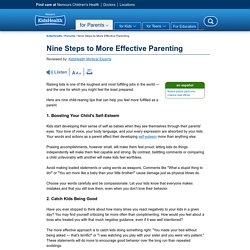
Here are nine child-rearing tips that can help you feel more fulfilled as a parent. 1. Boosting Your Child's Self-Esteem Kids start developing their sense of self as babies when they see themselves through their parents' eyes. Your tone of voice, your body language, and your every expression are absorbed by your kids. Praising accomplishments, however small, will make them feel proud; letting kids do things independently will make them feel capable and strong. Avoid making loaded statements or using words as weapons. Parenting Styles and their Effects on Children. A Parent's Guide to Surviving the Teen Years. You've lived through 2 a.m. feedings, toddler temper tantrums, and the back-to-school blues.
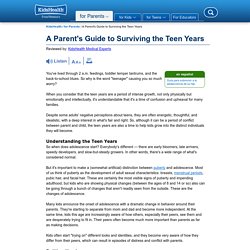
So why is the word "teenager" causing you so much worry? When you consider that the teen years are a period of intense growth, not only physically but emotionally and intellectually, it's understandable that it's a time of confusion and upheaval for many families. Despite some adults' negative perceptions about teens, they are often energetic, thoughtful, and idealistic, with a deep interest in what's fair and right. So, although it can be a period of conflict between parent and child, the teen years are also a time to help kids grow into the distinct individuals they will become.
Understanding the Teen Years So when does adolescence start? But it's important to make a (somewhat artificial) distinction between puberty and adolescence. Many kids announce the onset of adolescence with a dramatic change in behavior around their parents. Butting Heads Tips for Parenting During the Teen Years. What your teenager needs - Family Lives. There are particular skills that support children in learning how to manage for themselves, to trust their own judgment and develop their own skills.

When it comes to dealing with teenagers, we may use much the same skills as we did when they were younger, but at a greater remove. These include being encouraging and enabling, allowing children to learn from their mistakes rather than ‘showing them how to do it’, accepting they might do it differently from you, acknowledging and respecting their choices, following the child’s lead rather than jumping in with ideas, being in the present and spending time focused on your teenager.
What teens need All of us need to feel safe and protected, to have our physical requirements for food, clothing, warmth, healthcare met. One of the flash points with teenagers may be a conflict between parents wish to fulfil these needs and a teenagers apparent desire to frustrate or be unrealistic about them. Family time and meals “Helpful attention” Common Behaviors You'll See During Each Teen Year. Adolescence: Crash Course Psychology #20. Why Are Teenagers So Rebellious. What Is Reinforcement? What Is Punishment? Reinforcement and Punishment. Learning Objectives.
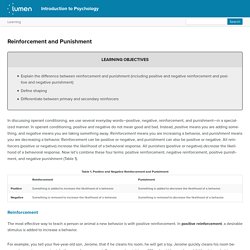
Reinforcement & Punishment. 3. Reinforcement Theory - PSYCH 484: Work Attitudes and Job Motivation. Overview of Reinforcement Theory Law of Effect Quantitative Law of Effect.

Using Positive Reinforcement to Improve Behavior. When your child misbehaves, rewards might be the last thing on your mind.
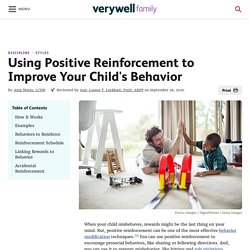
But, positive reinforcement can be one of the most effective behavior modification techniques.1 You can use positive reinforcement to encourage prosocial behaviors, like sharing or following directions. And, you can use it to prevent misbehavior, like hitting and rule violations. Positive reinforcement can also be an effective way to encourage and motivate your child to be responsible, do their chores, get along with their siblings, or complete their homework assignments without arguing. Positive Reinforcement and Operant Conditioning. In operant conditioning, positive reinforcement involves the addition of a reinforcing stimulus following a behavior that makes it more likely that the behavior will occur again in the future.
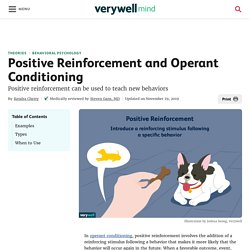
When a favorable outcome, event, or reward occurs after an action, that particular response or behavior will be strengthened. One of the easiest ways to remember positive reinforcement is to think of it as something being added. By thinking of it in these terms, you may find it easier to identify real-world examples of positive reinforcement. Positive Reinforcement.
Examples Of Positive Reinforcement For Teenagers. Negative Reinforcement: What Is It and How Does It Work? What is negative reinforcement?

Negative reinforcement is a method that can be used to help teach specific behaviors. With negative reinforcement, something uncomfortable or otherwise unpleasant is taken away in response to a stimulus. Over time, the target behavior should increase with the expectation that the unpleasant thing will be taken away. Read on to learn more about this type of learning. Negative Reinforcement and Operant Conditioning. Negative reinforcement is a term described by B.
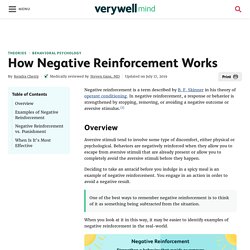
F. Skinner in his theory of operant conditioning. In negative reinforcement, a response or behavior is strengthened by stopping, removing, or avoiding a negative outcome or aversive stimulus.1 Overview Aversive stimuli tend to involve some type of discomfort, either physical or psychological. What is Negative Reinforcement? Examples Of Negative Reinforcement For Teenagers. Positive Punishment: What It Is, Benefits, and Examples. Positive punishment is a form of behavior modification. In this case, the word “positive” doesn’t refer to something pleasant. Positive punishment is adding something to the mix that will result in an unpleasant consequence. The goal is to decrease the likelihood that the unwanted behavior will happen again in the future. This approach may be effective in certain circumstance, but it’s only one part of the equation. Guiding your child toward alternative behaviors that are more appropriate to the situation are also needed.
10 Positive Punishment Techniques & Their Effect. By: Ashley Brown Updated February 11, 2021 Medically Reviewed By: Laura Angers As a parent, it is natural to wonder about the best way to teach your child right from wrong. What is Positive Punishment? Examples Of Positive Punishment For Teenagers. How Negative Punishment Works. What is Negative Punishment (Examples and Effectiveness) In this article, we will review negative punishment, its definition, examples, and drawbacks.
American psychologist B.F. Skinner developed the theory of operant conditioning, which stated that a person or animal’s behavior could be increased or decreased by adding or removing appropriate stimuli after the behavior is exhibited. Negative Punishment. Examples Of Negative Punishment For Teenagers. Conclusion. Positive vs Negative Reinforcement: Which Is More Effective? Table of Content: 1. What is Reinforcement? 2. Positive vs Negative Punishment - Psychestudy. Punishment is a fundamental concept of Operant Conditioning, whose major objective is to decrease the rate of certain undesired behavior from occurring again. Examples of Positive and Negative Reinforcement and Punishment: Operant Conditioning Explained. The Difference between Positive/Negative Reinforcement and Positive/Negative Punishment.
February 5, 2013 7:40 pm Published by Kelley Prince M.A., BCBA. Reinforcement vs. Punishment: Changing Behavior. Being a parent has been known as the best thing ever BUT also the most challenging endeavor you will encounter in your lifetime. Parents strive to raise a healthy and happy child that will one day grow up as a full-fledged mature and independent adult. Reinforcement vs. Punishment: What They Are & 12 Examples. "Reinforcement is anything that increases the likelihood that a person will exhibit the same behavior again in the future," says licensed psychologist Nicole Beurkens, Ph.D., CNS.